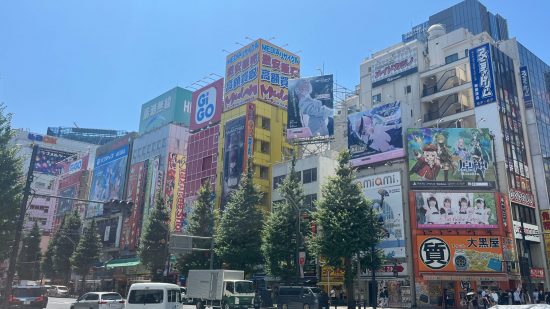If there is a center of the trading card game universe, it’s the Tokyo Akihabara district – and I just went there, so I can confirm it’s true. There are card game shops in every direction you turn, along with retro game stores, massive displays of iconic anime like Neon Genesis Evangelion, and a wealth of gachapon machines. It’s hard to imagine something like this in the West; picture for a minute an area of New York or London so full of local game stores that it becomes a Mecca to lovers of summoning and deck building. You can’t, can you? Me neither.
For those who don’t know, Akihabara is ground zero for otakus – that’s geek or nerd to you, me, and my high school bullies – in Tokyo, Japan. While areas like Shinjuku and Shibuya might be better-known shopping hubs, Akihabara is where the action is at for the pop culture-obsessed among us, where it is almost impossible to walk for a few meters without catching a glimpse of a Gundam mech, Yugi Moto, or fellow tourists soaking in the sights of a district that wears hobby appreciation on its sleeve.
While all of the big three card games are represented heavily in this otaku-laden district (fans of Pokémon TCG and Magic: The Gathering will find more than enough to enchant them), none is more prevalent than Yu-Gi-Oh!.
There are so many duelists littered throughout the area, playing in game stores, cafes, and basically wherever there’s space to put down a couple of game mats.
For those like myself who grew up on the Yu-Gi-Oh! anime series, it feels almost as if you’ve been dropped into the second arc, with Akihabara functioning as the perfect substitute for Battle City, but without the fanciful projection technology that is still the stuff of duelist dreams.
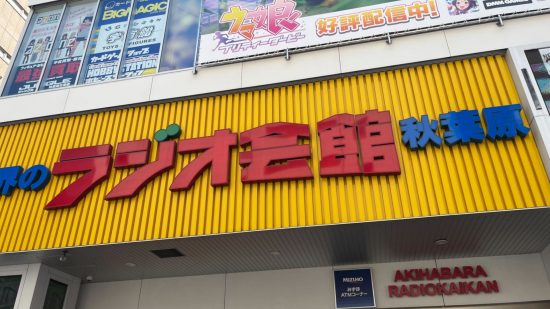
Of all the locations in Akihabara, the Akihabara Radio Kaikan building holds some of the most enticing. Ten floors make up the building, more than half of which are wall-to-wall glass cabinets of both English and Japanese-language cards.
They have everything here. Rare Dark Magicians? Got it. More Blue-Eyes White Dragons than you can shake a duel disk at? Yep. That incredibly obscure rare Yugioh card it seems like only you appreciate? Two copies, right in front of you.
Unsurprisingly, it’s some of those classic monster cards that make up some of the most expensive items available in the locked cabinets. In the image below, you can see a ghost rare OCG Curse of Dragon for the price of ¥11,970. That’s a whopping $80+ to you and me.
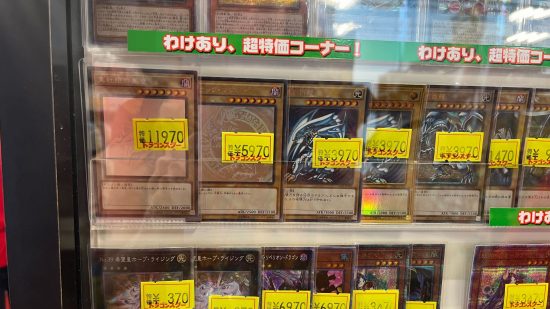
That, my friends, is not even the tip of the iceberg. In the same store, there’s a special edition prismatic rare copy of Yu-Gi-Oh! Master Duel cover star Ten Thousand Dragon for the equivalent of more than $1000. To those familiar with TCG prices, that probably doesn’t come as much of a shock. However, it’s a very different feeling looking at an eBay listing for a particularly expensive card when you’re gawping a a cabinet full of cards that combined are easily worth more than your yearly salary.
Still, it’s worth pointing out that not everything in the Kaikan building’s card stores is going to break the bank. Japan’s love for vending machines shines through even here, with stores like Full Comp and Hobbystation offering card vendors for both Yu-Gi-Oh! and Pokémon.
Unlike picking up a pack of cards and hoping for the best, here you can simply make a selection and wait for your chosen card to fall out the bottom of the machine. These vending machines are much more affordable, though it does take away the thrill of having to politely ask a shopkeeper if they can pull out that magic set of keys and unlock the glass cabinets, an act that draws the attention of fellow shoppers as they desperately try and judge your purchase. There are also plenty of booster packs and structure decks around, though, including some for the currently Japan-exclusive Yu-Gi-Oh! Rush Duel format.
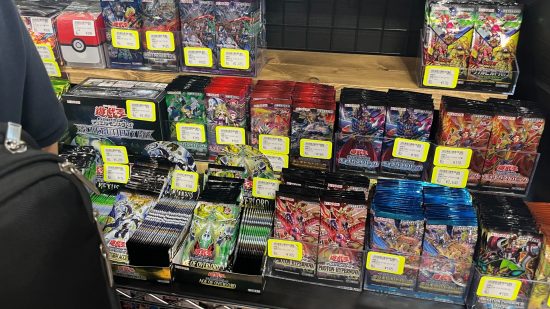
One of the best stores inside the Kaikan tower is Card Lab, with the layout clearly establishing which TCG is the most popular in-store by the fact that you can’t even glimpse into it without seeing a bunch of familiar faces from the Yu-Gi-Oh! anime series.
With the 25th anniversary of Konami’s card game just around the corner, promotional material is everywhere, including a high-quality render of Yugi Moto and Kaiba across an entire wall on the inside of the store.
Card Lab, or C-Labo as it says on the sign above the door, is also the largest dueling venue in the Kaikan building, with 64 seats for passing players to lay down some trap cards. With opening hours from 10:00-20:00 every day of the week, this dueling area is something of a hot spot.
I was there at around midday during the middle of this summer’s heatwave in Japan, which made it appear an even hotter hot spot, thanks to countless players occupying the tables and maintaining poker faces as they played out elaborate combos.
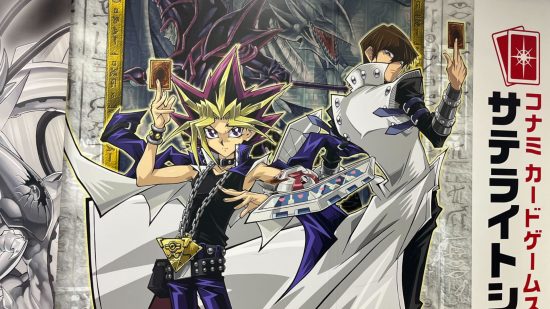
Part of what makes Card Lab so interesting is that it’s one of the few Konami-endorsed stores in wider Toyko. Much like in the United States and in Europe, Konami doesn’t have its own retailers and instead has a selected group of trusted local game stores they supply with promotional material and special edition products. This explains the sheer amount of familiar Yu-Gi-Oh! characters and paraphernalia that welcomes you, with the card game creator working hand in hand with the store to bring the best experience to fans of the franchise.
These Konami-endorsed locations are known as ‘Satellite Stores’, a concept almost lifted from the pages of Kazuki Takahashi’s original manga. If you’re a fan of the series, you have to pass through just for the decoration alone. I already mentioned the large graphic of Yugi and Kaiba from the anime, but those who are more concerned with the physical card game might prefer the elaborate Dragonmaid illustration that takes up part of the dueling area.
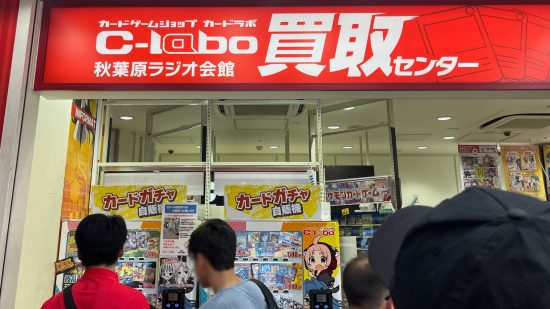
Of course, it’s not just Yu-Gi-Oh! that occupies the storefronts of the Akihabara Radio Kaikan building and the wider district. Despite never becoming quite as popular as it is in the West, Magic: The Gathering is a prominent fixture throughout these card locations, with early copies of cards going to eye-watering prices in some of the retailers. Most of the retailers across the ten floors dabble with Magic, even if it is playing third fiddle to the other members of the holy card game trio, but Big Magic is the place to go if you’re a Wizards devotee.
Your eyes aren’t deceiving you in the picture below. That is indeed, right in the the center of the shot, two copies of Timetwister for over one million yen. To save you a trip to Google’s currency converter, that equals out to about $7,000. As those with a bit of rare MTG cards knowledge may know, that’s around the price it goes for over here – but seeing a single card for sale for seven digits is something it takes a little while to become accustomed to.
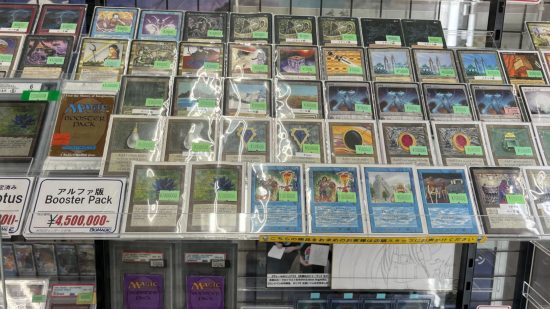
While the Magic displays are fittingly spellbinding – I saw one fellow tourist spend a solid half an hour staring into one of the countless cabinets on my trip up and down the tower – Yu-Gi-Oh!’s real competition in Japan these days comes in the form of Pokémon cards. Both have been around since the late nineties and command a swathe of fans across the world, but in many of the stores in Akihabara, the two brands have to share the shop floor and compete for the attention of TCG enthusiasts.
Unlike some of the other stores in the district, Yellow Submarine doesn’t play favorites, with all of the big three strongly represented, plus Digimon, Duel Masters, and, if you’re a sports fan, Japanese baseball cards. Outside of what I’ve seen on The Simpsons, I know little to nothing about baseball, but foil cards are foil cards, so it’s still a pretty mesmerizing display for the uninitiated.
It isn’t exclusively cards in Yellow Submarine, though, with a fine selection of model kits from series like Gundam, Neon Genesis Evangelion, and beyond. There are even a few Warhammer 40k models, as the game is growing fast in Japan – thought still not as popular as it is in the USA or UK.
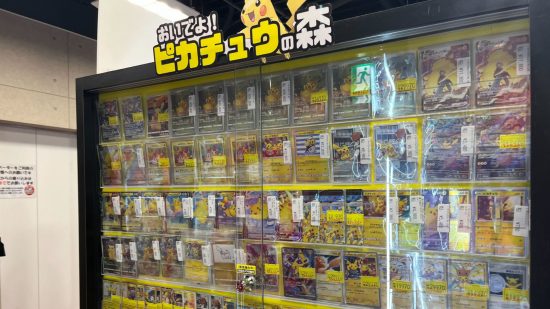
As a member of the Konami hardcore, even I couldn’t deny that the Pikachu-specific card cabinet from the picture above is enough to get anyone who grew up in the late nineties and early noughties incredibly excited. Much like how my attention is immediately drawn to the retro heroes of Yu-Gi-Oh!, like Dark Magician Girl and Buster Blader, seeing countless copies of special edition Pikachu card art is enough to make you want to throw all of your yen at the nearest cashier and leave with a hole in your wallet and a bunch of cards you can’t actually read.
Of course, the card game delights of Akihabara extend outside of the Radio Kaikan building, but you could spend hours across the many floors and still have more ground to cover. YouTube is littered with card game content creators having their minds blown like a trip to the shadow realm by just how prominent cards are in retailers throughout the district, with too many to list in one place.
There’s another interesting niche to the card stores of Akihabara, one that’s less commonly known than the fact it’s the otaku hub of Tokyo. Some of the card game stores have random TCG tournament trophies among their collection of cards and associated, delightful bric-a-brac.
Apparently, the custom for Japanese duelists who come out on top at tournament events – especially Yu-Gi-Oh! tournaments – is to hand that trophy over to the game store where they learned their trade. These trophies almost always have ‘not for sale’ signs attached to them, and act as a sort of badge of honor for game stores that have witnessed their best players take it to the national, and sometimes the world, stage.
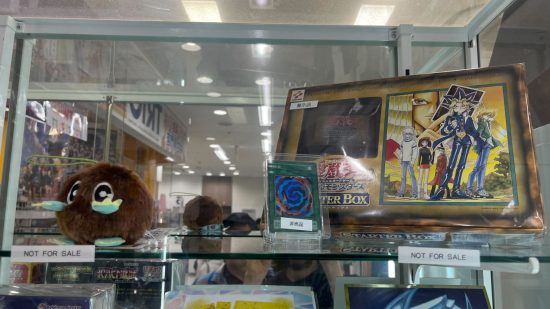
This handing over of trophies and trophy cards speaks to the feeling of community in Akihabara. You can be standing next to a stranger before finding yourself in a flowing conversation about the re-printing of a specific set or the combos you’re planning with the final piece of the puzzle right before your eyes.
It’s like its own little everyday TCG convention, with locals and tourists coming together to celebrate card games. I’d been told how incredible it is before I went, but it really is something to behold and to repeat my point from the start of this article, something I can only dream of popping up in the West.
So, if you ever find yourself with a bit of spare time in Tokyo – a situation I refer to as ‘living the dream’ – a trip to Akihabara is worth it whether you’re a card game enthusiast or not. While there is still a certain stigma to the TCG obsessed among us in the West, this relatively small district in Japan’s capital city is somewhere you can feel at home.
Hobbies here, be they card collecting or Gundam building, are wholeheartedly celebrated in a way you just don’t see anywhere else. Just remember to budget appropriately. My Japanese copy of Red-Eyes Black Dragon and I know just how easy it is to get carried away.
For more TCG features from Japan, check out our coverage of the Yu-Gi-Oh! World Championship 2023 and our Yu-Gi-Oh! World Champion interview Paulie Aronson live from this year’s event. If you’d rather swot up on the current game meta, we also have guides to the best Yugioh decks, the current Yugioh banlist, and even how to build a Yugioh deck.
